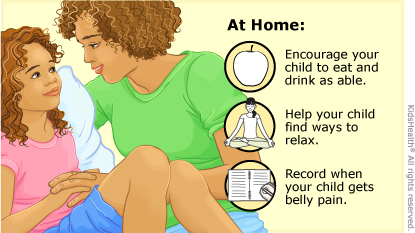Abdominal Pain: How to Care for Your Child
Abdominal (belly) pain happens to a lot of kids and usually doesn't have a serious cause. You can help by making sure your child stays hydrated and comfortable. Follow instructions on what your child should eat. Keep notes about the pain so you can let your health care provider know if the pain isn't getting better or gets worse.


-
Do the following, one at a time, to see if they help your child's belly pain:
-
Have your child lie down quietly and rest.
-
Have your child try to poop.
-
Have your child avoid solid foods for a few hours. During this time, only give clear liquids like broth, watered-down fruit juice, or water. Then, if your child feels better, try small amounts of mild foods like rice, applesauce, and crackers.
-
Offer 4 or 5 small meals a day (instead of 3 large meals a day).
-
Don't offer foods and drinks that may bother the stomach. These include soda, caffeine, orange juice, milk, cheese, fried or greasy food, high-fat foods, and tomatoes.
-
Limit foods and drinks that cause gas, like beans, broccoli, hard candy, and carbonated drinks like soda.
-
If your health care provider says it's OK, a medicine may help your child's pain. Be sure to use pain medicine exactly as instructed.
-
Don't give aspirin to your child or teen. It has been linked to a rare but serious illness called Reye syndrome.
-
Don't give your child laxatives, antacids, or other medicines unless recommended by the health care provider.
-
Talk to the health care provider before giving your child any supplements or herbs.
-
Make sure your child drinks liquids regularly and pees at least 3 times a day.
-
Write down times when your child has pain and what was going on when it happened.
-
Anxiety and stress can make belly pain worse. Help your child manage and relieve stress. Relaxation techniques might be helpful for older kids and teens. Counseling can help them learn healthy ways to deal with feelings and can sometimes help belly pain.

Your child:
-
has abdominal pain that gets worse, lasts more than 24 hours, or moves to one area of the belly
-
can't poop
-
develops a fever or nausea (feeling sick to the stomach)
-
has pain when peeing
-
is vomiting (throwing up)

Your child:
-
has a hard or swollen belly.
-
appears dehydrated; signs include dizziness, drowsiness, a dry or sticky mouth, sunken eyes, crying with few or no tears, or peeing less often (or having fewer wet diapers)

What can cause belly pain in kids? Belly pain can be caused by many things, including:
-
gas
-
constipation (having fewer poops than usual or large, hard-to-pass poops)
-
reflux (heartburn)
-
a food allergy or intolerance
-
infection in the digestive system, ear, lung, throat, or bladder
-
swollen lymph nodes (glands) in the belly
-
anxiety (worrying a lot) or stress
Sometimes, the cause of abdominal pain isn't found.